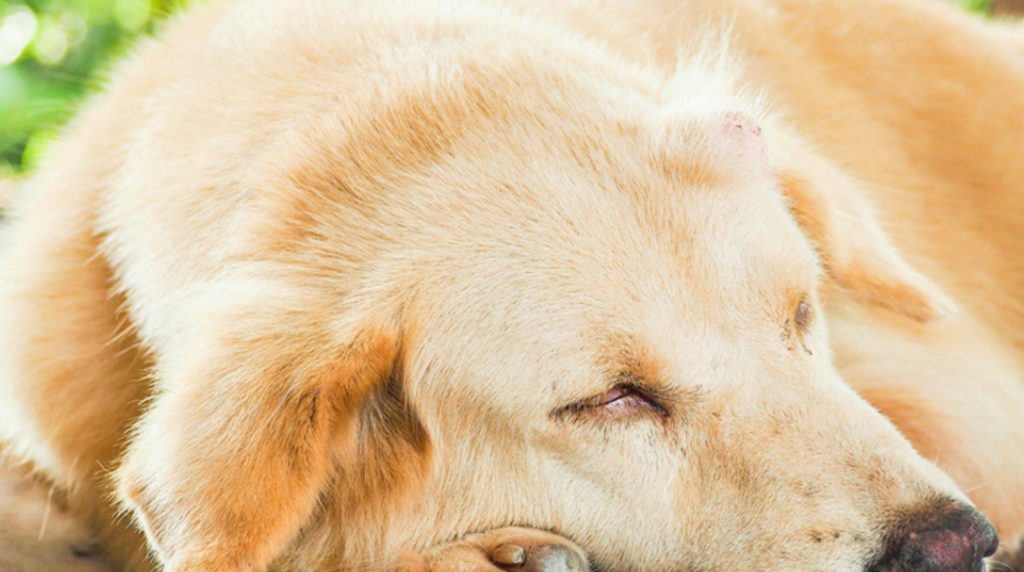Skin cancer in dogs is one of the diagnoses that owners are particularly shocked by. It is more important that you regularly check your dog for changes and have them clarified by the vet. Read here which signs you should take seriously and which treatment options are available in the case of skin cancer.

If you have discovered a skin tumour in your dog, there is a high probability that the vet will not find skin cancer: 70 to 80 per cent of skin tumours are benign and therefore mostly harmless. But it is also true that skin cancer in dogs is often fatal. Every second four-legged friend over the age of ten dies of cancer.
What types of skin cancer are there?
It is primarily the older dogs at increased risk of being affected by malignant skin tumours. The types of the disease are different; there are these skin cancer variants:
● Squamous Cell Cancer (Squamous Cell Carcinoma)
● Black skin cancer (malignant melanoma)
● Mast cell sarcoma (malignant mastocytoma)
● Basal cell carcinoma (basalioma)
● Fibrosarcoma
How can I recognize symptoms of skin cancer?
Your four-legged friend can be affected by individual tumours or tumour groups – in most cases, the growths can be felt easily. It is often the extremities such as legs and paws affected by skin cancer. But it can also occur on the stomach, back, neck or head. You should take these symptoms particularly seriously because they could indicate skin cancer:
● Hardening
● swelling
● Redness
● itching
But symptoms that affect the general condition of your four-legged friend can also indicate skin cancer. These include:
● loss of appetite
● weight loss
● Apathy and listlessness
● Irregularities in heartbeat and blood pressure
● Cough (normal or with phlegm)
● Heavy breathing
● vomiting (normal or bloody)
● diarrhoea
● Abdominal pain
● Blood in the stool (also discolouration of the excrement to dark to jet black)
● Swelling in the lymph nodes
● Bleeding and impaired wound healing
Skin cancer or not: This is how the vet makes the diagnosis
First, the vet takes a close look at the skin change. In many cases, it is possible to distinguish benign skin changes, such as warts, from malignant tumours at first glance. You, as the owner, are also asked: Your information about how long the skin change has been occurring, how quickly a tumour has grown or what other complaints your dog is suffering from are important details for a good diagnosis.
In cases of doubt, the veterinarian takes a tissue sample, also called a biopsy, at the site of the skin change. He examines this sample under a microscope to be able to distinguish between benign and malignant tumours. Complete removal and a subsequent examination are also common in the case of conspicuous skin tumours.
What therapies are there?
If it is skin cancer, the vet will remove the tumour. Adjacent healthy tissue is also affected to ensure all malignant cells are eliminated.
Other treatments include chemotherapy and radiation therapy. Since chemotherapy in dogs requires a much lower dosage than in humans, your four-legged friend also suffers from fewer side effects. This type of therapy aims to avoid pain: your dog should live pain-free for as long as possible.
In many cases, radiation therapy is a measure to shrink the tumour before surgery. After the operation, the radiation is continued so that the chance of final destruction of all foreign cells is as large as possible.
What is the prognosis if my dog has skin cancer?
If your dog has been diagnosed with skin cancer, the stage of the tumour and the type of tumour will determine the prognosis. Early detection of the disease is essential for the chances of recovery from skin cancer because the earlier the veterinarian can start treatment. It would help if you were correspondingly attentive to conspicuous and rapidly progressing skin changes. Have these and other symptoms checked by the veterinarian as early as possible?










